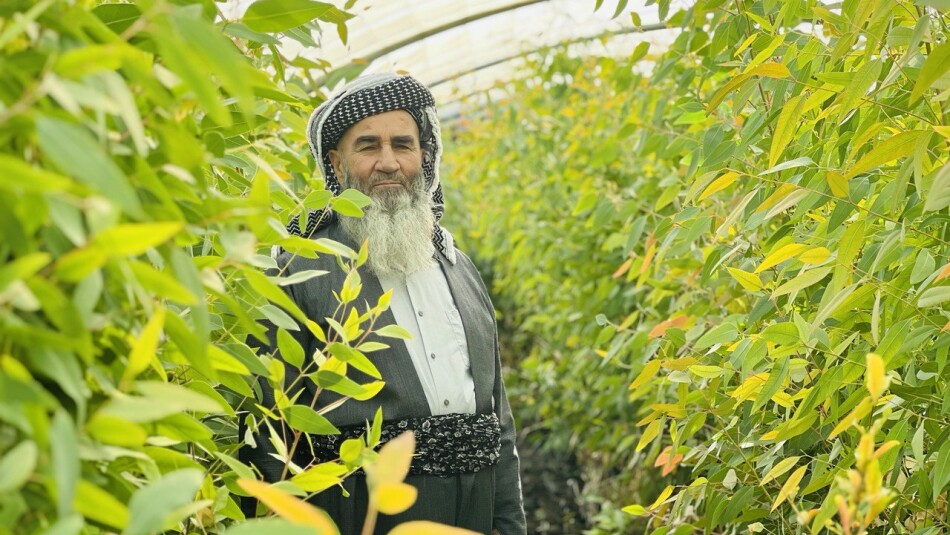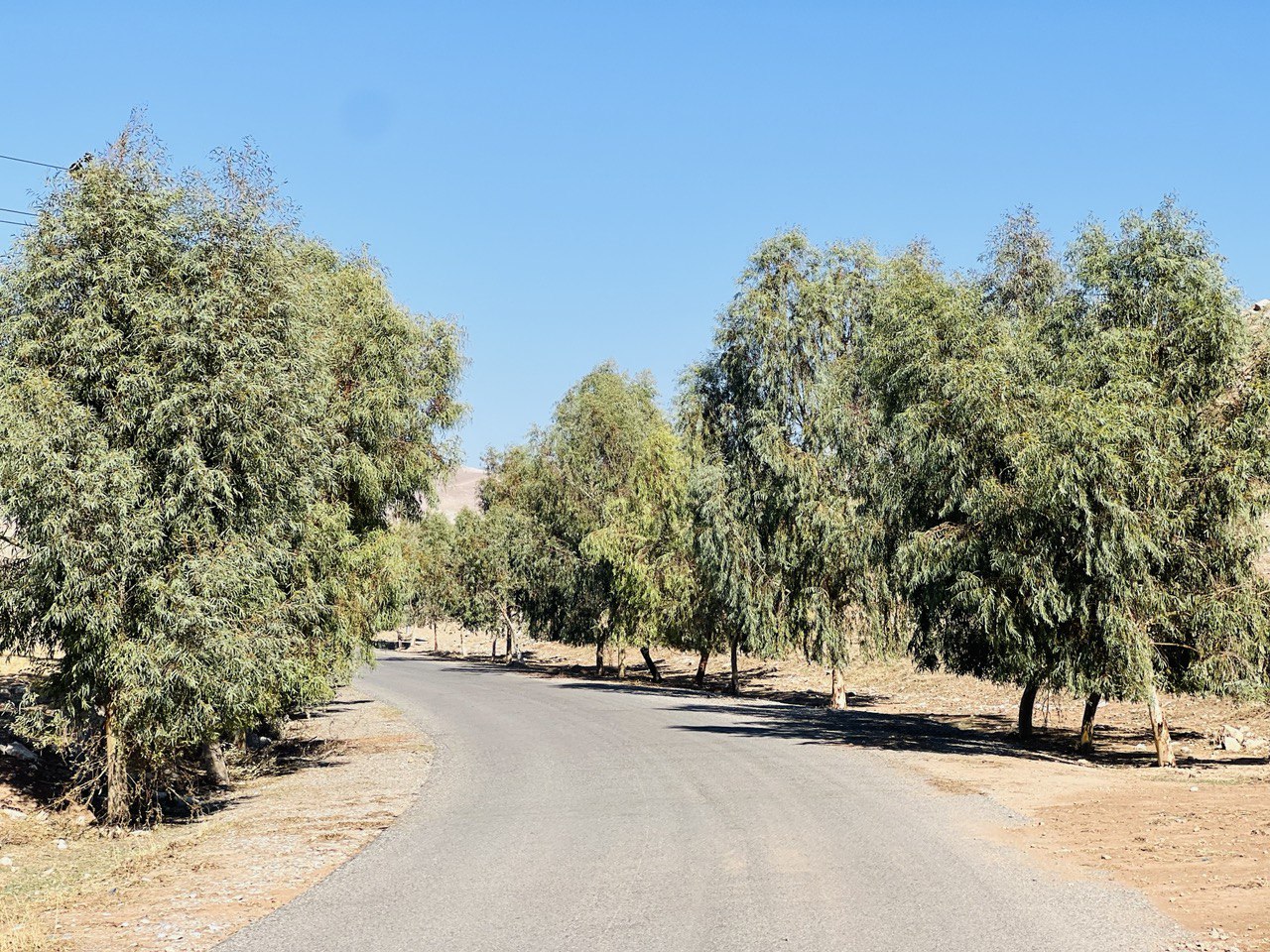
At the entrance to the village of "Askar", your eyes fall on rows of pine trees planted on both sides of the road along five kilometers, while 7,000 olive trees add a unique view to the mountainous areas surrounding the village.
This environmental initiative, although individual, is part of the efforts made to sustain life in the villages and reduce migration to cities.
The insistence on continuing to live in the village and serving the environment comes at a time when displacement increased throughout Iraq between 2021 and 2023 by rates ranging between 2 to 5%, according to a report by the Humanitarian Practical Network (HPN), which was based on data from the International Organization for Migration (IOM).
Behind these exceptional efforts in the village of Askar in the Aghjalar sub-district of the Chamchamal district is a 70-year-old man named Anwar Suleiman. Four decades ago, the village was bombed with chemical weapons and the Anfal campaigns that claimed the lives of hundreds of its residents, who were completely evacuated.
In the past two decades, when the villagers began to return, Anwar embarked on a mission to serve the environment on a voluntary basis in order to create more green spaces and maintain the cleanliness of the environment, bringing back life to the village again.
What Anwar is doing coincides with villagers leaving their lands to cities, as the results of the last population census conducted on November 20 indicate that only 16% live in villages, while the percentage according to the 1997 census was about 26%.
Victims of chemical bombing and Anfal campaigns care for the environment
Anwar, one of the survivors of the chemical bombing of his village and one of the victims of the Anfal campaigns that caused the loss of a number of his family members, says, "So far, I have planted 13,000 trees to a greener Askar village."
The Anfal crimes were committed by the Baathist regime chaired by Saddam Hussein against the residents of different areas of the Kurdistan Region and Kirkuk province. According to the statistics of the regional government, about 182,000 Kurds were killed in the Anfal campaigns after they were buried alive in the deserts of western Iraq. The regional government designated April 14 of each year as a day to remember the tragedy.
"This is my passion, and I also aim to gain the pleasure of God and provide a simple service to my village."
In addition to planting 7,000 olive trees and planting trees at the entrance to the village along a five-kilometer stretch, Anwar also planted trees in the village cemetery, in addition to planting hundreds of trees inside the village.

"Some of the trees I planted were burned or damaged during the summer, but I intend to plant other trees in their place."
Amanj Jawhar, the mayor of Aghjalar, says he is aware of Anwar's efforts. "The municipality cooperated with him in planting olive trees by providing workers to water the trees during the summer months."
"The existence and expansion of such projects is very beneficial to the environment in terms of combating desertification and the effects of climate change, and it is also beneficial to the tourism sector," according to the Mayor of Aghjalar.
Climate change in Iraq directly leads to the evacuation of villages and migration to cities, especially with regard to water scarcity and increasing tension within communities.
I am ready to provide seedlings for free to anyone who wants to plant and care for them in the village
According to a survey conducted by the Norwegian Refugee Council (NRC) in Iraq, about 40% of participants indicated that the level of tension in the community increased during 2022, and they linked the tension to the drought wave in the region, but the percentage decreased to 4% in 2023.
"This project is strongly related to the amount of rainfall recorded throughout the country, because the amount of rainfall in 2022 was less compared to 2023," according to the NRC.
Ako Mustafa, a young man from the village of Askar, said, "We spray the surroundings of the trees with herbicides every year so that they do not cause damage to the trees during fires."
Nurseries serving the environment
Suleiman owns two small nurseries in the village that provide him with a source of livelihood and at the same time serve the village for free.
"I am ready to provide seedlings for free to anyone who wants to plant and care for them in the village."
Ako Mustafa, who helps Anwar manage the nurseries, said, “The purpose of establishing the nurseries is to replace the trees that are damaged by fires and other things by planting other trees in their place. Now I can say that we have planted the largest number of trees in the village of Askar.”
The local government in the region, including the municipality of Aghjalar, welcomes such individual efforts.
“We encourage people to preserve the environment and talk in schools about the role and importance of the environment. The issue of the environment and climate change is a global issue and we must contribute to protecting and improving the environment of the region,” the mayor says.
Increasing green spaces directly affects reducing carbon dioxide emissions and producing more oxygen. Environmental experts also stress that it helps increase the percentage of fresh air and maintain a clean environment.
According to the Ministry of Health MOH in the Kurdistan Regional Government KRG, environmental pollution is one of the causes of cancer, with 9,911 cases recorded in 2023. Statistics published on World Cancer Day (February 4) indicate that lung cancer is the second most common case.
"In the past four years, we have planted about 4,000 trees in the district as part of the establishment of three green spaces," said the mayor of Aghjalar.
Insufficient Support
Suleiman says that there are some problems and challenges that he is unable to overcome, but he stressed that he has not lost hope.
“At first, the government helped me do my job by providing a number of municipal workers to take care of the trees inside the village and in the cemetery, but it stopped providing this support two years ago."
Unfortunately, people do not cooperate with us in the necessary manner in planting and caring for trees
The fires in the district of Aghjalar during the summer is another challenge that hinders Anwar Suleiman’s project.
Last summer alone, 12,397 donums of land were burned within the borders of 15 villages affiliated with the sub-district of Aghjalar, according to the district director, Hemin Bahjat.
The region generally depends on rainwater, which represents another challenge facing Anwar Suleiman.
The climate of the region is characterized by being dry and hot in the summer, which hinders the growth of trees.
“In the past years, we planted 1,000 pine trees, but due to our lack of experience, we did not realize that they were not suitable for the environment of the region, so they all dried up,” Anwar said.
“Unfortunately, people do not cooperate with us in the necessary manner in planting and caring for trees... I often take care of them by myself,” he added.